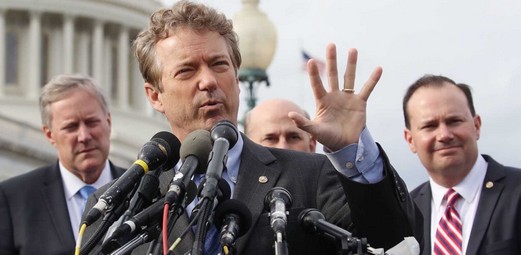Senate & House Conservatives Oppose ‘Obamacare Lite’ Legislation; Have Better Replacement
Ever since the American Health Care Act was introduced by House Republicans, conservatives have been blasting it as “Obamacare Lite.”
Daily Wire Editor-in-Chief Ben Shapiro recently wrote about the bill’s five most critical faults. It “retains requirements that insurance cover people with pre-existing conditions,” making insurance into a “piggy bank” rather than a sustainable risk assessment business. It “creates a backdoor mandate” by allowing insurance companies to impose a 30% fee on those who allow their coverage to lapse for a period of time. It creates a new subsidy through age-based tax credits. It “subsidizes Medicaid,” and it would dole out “$100 billion to states over the next ten years to help cover those who are high risk and can’t afford insurance.”
While there are certainly good aspects of the bill, they are blighted by severe flaws.
Appearing on Fox News on March 4, Senator Rand Paul (R-KY) explained why conservatives in the Senate dislike the House bill:
“I’ll give you three instances that are in the bill that we [conservatives] object to:
There’s a new entitlement program. So, if you don’t pay any taxes, they’re going to give you back taxpayer money – a significant amount – and it’s going to be based in its growth over time, its inflation, about five percent a year. That’s a new entitlement program … those are the tax credits. It’s just not a Republican type of idea. To me, it’s a Democrat idea they’re trying to dress in Republican clothing.
… They’re keeping the Cadillac Tax – they’re kind of renaming it, and making it a little bit different, but essentially, if you have really good insurance, they’re gonna tax it.
And then the third thing they’re doing is they’re keeping a form of the individual mandate. You remember everybody complained? All Republicans said: ‘Individual mandate [is] terrible.’ They’re keeping it, but instead of you paying a penalty to the government, you’re gonna have to be – and it’s a mandate, it’s a law – you’re gonna have to pay a penalty to the insurance company.”
Senator Paul, Senator Ted Cruz (R-TX), as well as several conservative members of the House, have stated they will not vote for the Obamacare replacement bill as it currently stands.
Paul has said that he would prefer a clean repeal, and a simultaneous vote on a separate replacement bill. In fact, the Senator from Kentucky has drafted a replacement bill that, while not perfect, is multiple orders of magnitude better than the House’s American Health Care Act.
Paul’s bill, called The Obamacare Replacement Act (S. 222), would repeal the individual and employer mandate; allow “individuals who receive health insurance through an employer” to “exclude the premium amount from their taxable income”; and incentivize insurance purchasing outside of employment by “providing a universal deduction on both income and payroll taxes regardless of how an individual obtains their health insurance.”
The legislation would promote Health Savings Accounts (HSA) by giving “individuals the option of a tax credit of up to $5,000 per taxpayer for contributions to an HSA.”
Christopher Jacobs of The Federalist explains the difference between Paul’s tax credits and those enumerated in the House bill:
Paul’s bill provides a $5,000 tax credit to individuals who contribute to Health Savings Accounts (HSAs), but only to the extent such individuals have income tax liability. The Paul bill does include a refundable tax credit for health insurance premiums, but the refundable portion of the credit only applies up to the limit of an individual’s payroll taxes paid … the Paul bill would ensure that credits only apply to individuals with actual payroll and income tax obligations.
Paul’s plan would eliminate the cap on contributions to HSAs; it would also eliminate the requirement that “HSA participants be enrolled in a high deductible health care plan.” The legislation would tear down restrictions on insurance sales across state lines; it would establish “Independent Health Pools (IHP) in order to allow individuals to pool together for the purposes of purchasing insurance.” This way, churches, associations, and other entities could form collectives in order to bargain for insurance.
The bill would loosen Labor Department regulations, thus allowing more “small businesses to pool together across state lines … to purchase health coverage for their employees and their families.” These are known as Association Health Plans (AHP).
There are several other provisions in the bill proposed by Senator Rand Paul, including a controversial “two-year open enrollment period under which individuals with pre-existing conditions can obtain coverage.”
Despite some questionable policies, such as the open enrollment period and the HSA cap elimination, Paul’s bill attempts to readjust the focus of healthcare back onto patients and free markets.
There are many people on both sides of the aisle claiming that conservatives don’t have their own replacement; that they’re Chicken Littles who are panicking over nothing, and offering no alternative solutions. This is patently false. While the solutions conservatives are offering may also contain flaws, they are indeed being put forward, and on average, are much better than the House plan.






